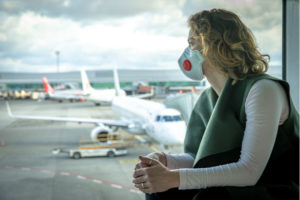
By Eduard Goricev @ Shutterstock.com
Provided by Sara Clemence and Barbara Peterson
Abridged from the WSJ:
-
- Cancel Your Trip because of Coronavirus?
It depends, reports primarily on where you’re planning to travel, but on other factors, too. The virus has spread to dozens of countries and every continent except for Antarctica. But government agencies are warning against travel to only a handful of destinations.
The U.S. State Department and the Centers for Disease Control and Prevention (CDC) are advising people not to visit China, the center of the outbreak.
The CDC has issued the same type of Level 3 alert (“avoid all nonessential travel”) for South Korea, Italy and Iran, where the highest number of cases outside of China have been diagnosed.
More Countries Offering Guidance
These warnings “are things that should be taken seriously,” said Dr. Richard Dawood, a travel medicine specialist and medical director for the Fleet Street Clinic in London.
On Sunday, the Italian government went beyond a warning, issuing a lockdown for northern Italy, banning people from entering or leaving much of the region, including Milan and Venice.
The Bottom Line
With the recent escalation of confirmed cases on cruise ships, the CDC and the U.S. State Department are now advising travelers, particularly those with underlying health issues, to avoid all cruise trips. and recommends older adults and travelers with underlying health issues to avoid long plane trips.
-
- Headed to Japan?
The CDC has issued a Level 2 alert—meaning travelers should “reconsider” their plans—for Japan.
Don’t Underestimate Good Ol’ Common Sense
What does “reconsider” mean? If you are older or have a condition such as asthma or diabetes, canceling trips to those destinations is a good idea, said Dr. Shanthi Kappagoda, infectious disease physician at Stanford Health Care in Palo Alto, CA.
-
- Other Countries Where the Virus Has Been Reported?
Most of the other countries have only detected a handful of coronavirus cases, and many of the patients are people who were repatriated from China, Dr. Dawood said.
“The risk to people traveling is actually very small outside the counties where there have been big numbers of cases.”
-
- San Francisco Declared a State of Emergency – Avoid San Fran?
The declaration frees the city and county government to mobilize more resources to fight the spread of coronavirus.
-
- Err on the Side of Caution: Totally Avoiding Flying? Wear a Mask?
Follow the CDC’s warning against all nonessential travel to China and South Korea. There’s no reason to stay off airplanes. The World Health Organization (WHO) is advising travelers to exercise the same precautions used to avoid catching any bug:
Keep hands clean and use antiseptic wipes on any surfaces, such as tray tables and armrests, where germs could linger.
Contrary to popular belief, cabin air is less of a concern; virtually all international jetliners are equipped with High Efficiency Particulate Air (HEPA) filters, similar to those used in hospital operating rooms; cabin air is refreshed every two to three minutes.
Most medical experts say that facemasks won’t protect you from other people’s illnesses; you’ll just prevent your own germs from spreading. Keep in mind that the virus spreads by droplets, not airborne transmission. (For more on masks, see “Is there anything extra I should pack?” below.)
-
- Avoid Crowded Events? Cancel Spring Break to Walt Disney World?
No. There are still relatively few cases in the U.S., pointed out Dr. Lisa Lockerd Maragakis, senior director of infection prevention for the Johns Hopkins Health System, and the new coronavirus isn’t a reason to avoid events or gathering places.
“We may get to the point where that is a public health measure that is recommended. But we’re not at that point now.”
Still, think twice in countries where the virus has spread more widely. “It makes sense to avoid crowded places where there’s ongoing person-to-person transmission,” Dr. Kappagoda said.
-
- Pack Anything Extra?
While most experts agree that the flimsy paper masks don’t protect you, some say the industrial-strength N95 ones can help. Dr. David Eisenman, director of the UCLA Center for Public Health and Disasters, said he wouldn’t pack a facemask.
Don’t Touch Your Face
If he were to pack one, it would be to give to a sick person he comes across (on the plane, for example). Masks keep the droplets created when people cough or sneeze from spreading, but to protect healthy people from germs, they have to be used correctly—something some young doctors don’t even do, he said. Using them incorrectly can create a false sense of security and even heighten the risk of contagion: It’s hard to resist scratching and making adjustments, and touching your face is a great way to infect yourself with a virus.
You should carry hand sanitizer with 60% to 95% alcohol, said Dr. Kappagoda, and use it frequently—especially after using the bathroom and before eating. Antiseptic wipes aren’t a bad idea, either. [You can also make your own hand sanitizer.]
“We are more likely to get a viral infection from touching surfaces or other people than people coughing on us.”
-
- Make Your Own Throat Sanitizer?
If you’re willing to fight for Main Street America, click here to sign up for the Richardcyoung.com free weekly email.





